北京市丰台区2015年高三年级第二学期统一练习(二)(英语)
- 格式:pdf
- 大小:634.21 KB
- 文档页数:13
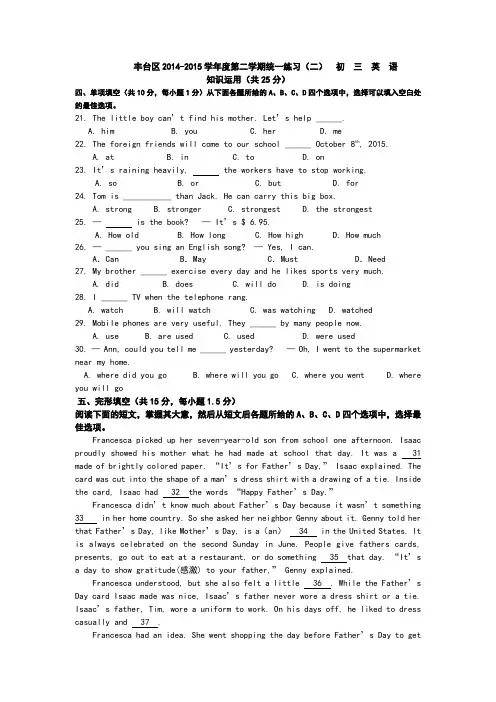
丰台区2014-2015学年度第二学期统一练习(二)初三英语知识运用(共25分)四、单项填空(共10分,每小题1分)从下面各题所给的A、B、C、D四个选项中,选择可以填入空白处的最佳选项。
21. The little boy can’t find his mother. Let’s help ______.A. himB. youC. herD. me22. The foreign friends will come to our school ______ October 8th, 2015.A. atB. inC. toD. on23. It’s raining heavily, the workers have to stop working.A. soB. orC. butD. for24. Tom is ___________ than Jack. He can carry this big box.A. strongB. strongerC. strongestD. the strongest25. — is the book? —It’s $ 6.95.A. How oldB. How longC. How highD. How much26. — ______ you sing an English song? — Yes, I can.A.Can B.May C.Must D.Need27. My brother ______ exercise every day and he likes sports very much.A. didB. doesC. will doD. is doing28. I ______ TV when the telephone rang.A. watchB. will watchC. was watchingD. watched29. Mobile phones are very useful. They ______ by many people now.A. useB. are usedC. usedD. were used30. — Ann, could you tell me ______ yesterday? — Oh, I went to the supermarketnear my home.A. where did you goB. where will you goC. where you wentD. whereyou will go五、完形填空(共15分,每小题1.5分)阅读下面的短文,掌握其大意,然后从短文后各题所给的A、B、C、D四个选项中,选择最佳选项。
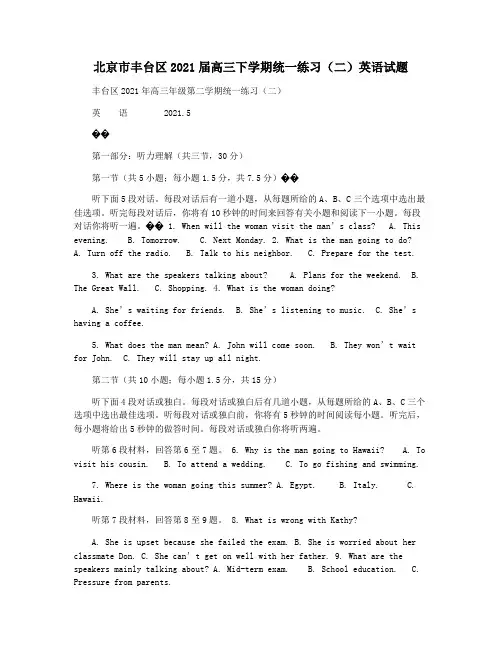
北京市丰台区2021届高三下学期统一练习(二)英语试题丰台区2021年高三年级第二学期统一练习(二)英语 2021.5��第一部分:听力理解(共三节,30分)第一节(共5小题;每小题1.5分,共7.5分)��听下面5段对话。
每段对话后有一道小题,从每题所给的A、B、C三个选项中选出最佳选项。
听完每段对话后,你将有10秒钟的时间来回答有关小题和阅读下一小题。
每段对话你将听一遍。
�� 1. When will the woman visit the man’s class? A. This evening. B. Tomorrow. C. Next Monday. 2. What is the man going to do?A. Turn off the radio.B. Talk to his neighbor.C. Prepare for the test.3. What are the speakers talking about? A. Plans for the weekend. B. The Great Wall. C. Shopping.4. What is the woman doing?A. She’s waiting for friends.B. She’s listening to music.C. She’s having a coffee.5. What does the man mean? A. John will come soon. B. They won’t wait for John. C. They will stay up all night.第二节(共10小题;每小题1.5分,共15分)听下面4段对话或独白。
每段对话或独白后有几道小题,从每题所给的A、B、C三个选项中选出最佳选项。
听每段对话或独白前,你将有5秒钟的时间阅读每小题。
听完后,每小题将给出5秒钟的做答时间。
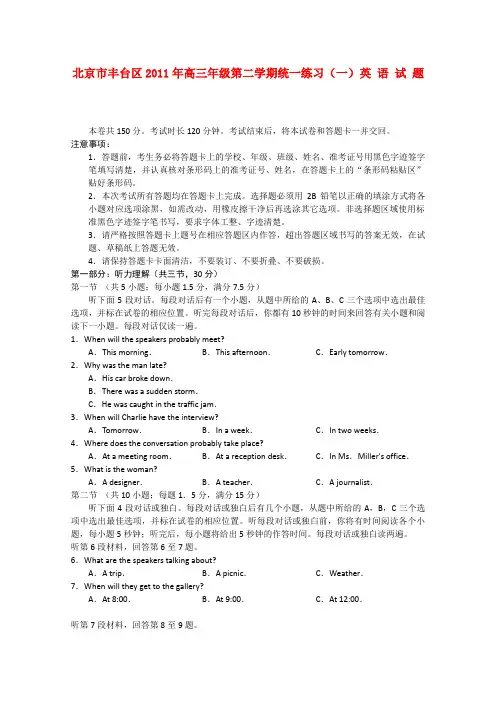
北京市丰台区2011年高三年级第二学期统一练习(一)英语试题本卷共150分。
考试时长120分钟。
考试结束后,将本试卷和答题卡一并交回。
注意事项:1.答题前,考生务必将答题卡上的学校、年级、班级、姓名、准考证号用黑色字迹签字笔填写清楚,并认真核对条形码上的准考证号、姓名,在答题卡上的“条形码粘贴区”贴好条形码。
2.本次考试所有答题均在答题卡上完成。
选择题必须用2B铅笔以正确的填涂方式将各小题对应选项涂黑,如需改动,用橡皮擦干净后再选涂其它选项。
非选择题区域使用标准黑色字迹签字笔书写,要求字体工整、字迹清楚。
3.请严格按照答题卡上题号在相应答题区内作答,超出答题区域书写的答案无效,在试题、草稿纸上答题无效。
4.请保持答题卡卡面清洁,不要装订、不要折叠、不要破损。
第一部分:听力理解(共三节,30分)第一节(共5小题;每小题1.5分,满分7.5分)听下面5段对话。
每段对话后有一个小题,从题中所给的A、B、C三个选项中选出最佳选项,并标在试卷的相应位置。
听完每段对话后,你都有10秒钟的时间来回答有关小题和阅读下一小题。
每段对话仅读一遍。
1.When will the speakers probably meet?A.This morning.B.This afternoon.C.Early tomorrow.2.Why was the man late?A.His car broke down.B.There was a sudden storm.C.He was caught in the traffic jam.3.When will Charlie have the interview?A.Tomorrow.B.In a week.C.In two weeks.4.Where does the conversation probably take place?A.At a meeting room.B.At a reception desk.C.In Ms.Miller's office.5.What is the woman?A.A designer.B.A teacher.C.A journalist.第二节(共10小题;每题1.5分,满分15分)听下面4段对话或独白。
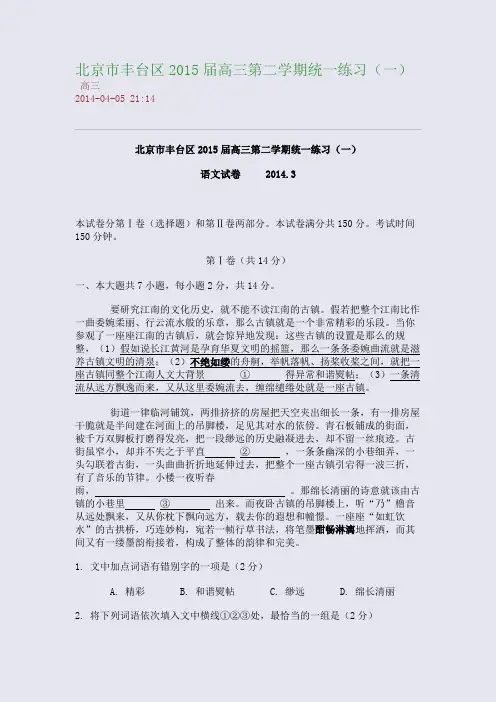
北京市丰台区2015届高三第二学期统一练习(一)高三2014-04-05 21:14北京市丰台区2015届高三第二学期统一练习(一)语文试卷 2014.3本试卷分第Ⅰ卷(选择题)和第Ⅱ卷两部分。
本试卷满分共150分。
考试时间150分钟。
第Ⅰ卷(共14分)一、本大题共7小题,每小题2分,共14分。
要研究江南的文化历史,就不能不读江南的古镇。
假若把整个江南比作一曲委婉柔丽、行云流水般的乐章,那么古镇就是一个非常精彩的乐段。
当你参观了一座座江南的古镇后,就会惊异地发现:这些古镇的设置是那么的规整,(1)假如说长江黄河是孕育华夏文明的摇篮,那么一条条委婉曲流就是滋养古镇文明的清泉;(2)不绝如缕的舟舸,举帆落帆、扬桨收桨之间,就把一座古镇同整个江南人文大背景①得异常和谐熨帖;(3)一条清流从远方飘逸而来,又从这里委婉流去,缠绵缱绻处就是一座古镇。
街道一律临河铺筑,两排挤挤的房屋把天空夹出细长一条,有一排房屋干脆就是半间建在河面上的吊脚楼,足见其对水的依傍。
青石板铺成的街面,被千万双脚板打磨得发亮,把一段缈远的历史融凝进去,却不留一丝痕迹。
古街虽窄小,却并不失之于平直②,一条条幽深的小巷细弄,一头勾联着古街,一头曲曲折折地延伸过去,把整个一座古镇引宕得一波三折,有了音乐的节律。
小楼一夜听春雨,。
那绵长清丽的诗意就该由古镇的小巷里③出来。
而夜卧古镇的吊脚楼上,听“乃”橹音从远处飘来,又从你枕下飘向远方,载去你的遐想和幢憬。
一座座“如虹饮水”的古拱桥,巧连妙构,宛若一帧行草书法,将笔墨酣畅淋漓地挥洒,而其间又有一缕墨韵衔接着,构成了整体的韵律和完美。
1. 文中加点词语有错别字的一项是(2分)A. 精彩B. 和谐熨帖C. 缈远D. 绵长清丽2. 将下列词语依次填入文中横线①②③处,最恰当的一组是(2分)A. 勾织简约演绎B. 勾织简短演绎C. 构画简约演化D. 构画简短演化3. 文中黑体字熟语,运用不当的一项是(2分)A. 行云流水B. 不绝如缕C. 一波三折D. 酣畅淋漓4. 文中划横线的(1)(2)(3)句衔接不当,下列调整语序正确的一项是(2分)A. (1)(3)(2)B. (2)(1)(3)C. (2)(3)(1)D. (3)(1)(2)5. 将下列诗句填入文中波浪线处,与“小楼一夜听春雨”对仗最工整的一项是(2分)A. 多少楼台烟雨中B. 残花落尽见流莺C. 吹面不寒杨柳风D. 深巷明朝卖杏花6. 下列句中加点词的运用,不同于其他三句的一项是(2分)A. 一条清流从远处飘逸而来,又从这里委婉流去B. 那么一条条委婉曲流就是滋养古镇文明的清泉C. 青石板铺成的街面,被千万双脚板打磨得发亮D. 又从你枕下飘向远方,载去你的遐想和憧憬7. 下列概括江南古镇特点的词语,最恰当的一项是(2分)A. 整洁B. 雄丽C. 幽美D. 空蒙第Ⅱ卷(136分)二、本大题共6小题,共20分。
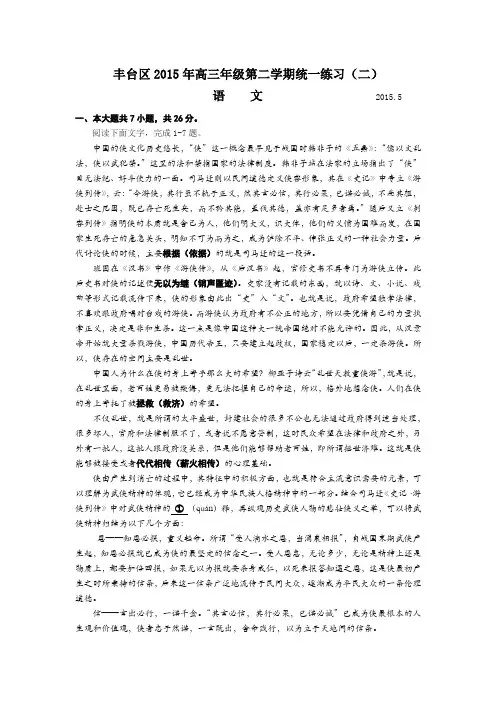
丰台区2015年高三年级第二学期统一练习(二)语文2015.5一、本大题共7小题,共26分。
阅读下面文字,完成1-7题。
中国的侠文化历史悠长,“侠”这一概念最早见于战国时韩非子的《五蠹》:“儒以文乱法,侠以武犯禁。
”这里的法和禁指国家的法律制度。
韩非子站在法家的立场指出了“侠”目无法纪、好斗使力的一面。
司马迁则以民间道德定义侠客形象,其在《史记》中专立《游侠列传》,云:“今游侠,其行虽不轨于正义,然其言必信,其行必果,已诺必诚,不爱其躯,赴士之厄困,既已存亡死生矣,而不矜其能,羞伐其德,盖亦有足多者焉。
”随后又立《刺客列传》指明侠的本质就是舍己为人,他们明大义,识大体,他们的义愤为国难而发,在国家生死存亡的危急关头,明知不可为而为之,成为铲除不平、伸张正义的一种社会力量。
后代讨论侠的时候,主要根据(依据)的就是司马迁的这一段话。
班固在《汉书》中作《游侠传》,从《后汉书》起,官修史书不再专门为游侠立传。
此后史书对侠的记述便无以为继(销声匿迹)。
史家没有记载的东西,就以诗、文、小说、戏曲等形式记载流传下来,侠的形象由此出“史”入“文”。
也就是说,政府希望独掌法律,不喜欢跟政府唱对台戏的游侠。
而游侠认为政府有不公正的地方,所以要凭借自己的力量执掌正义,决定是非和生杀。
这一点是像中国这种大一统帝国绝对不能允许的。
因此,从汉景帝开始就大量杀戮游侠,中国历代帝王,只要建立起政权,国家稳定以后,一定杀游侠。
所以,侠存在的空间主要是乱世。
中国人为什么在侠的身上寄予那么大的希望?柳亚子诗云“乱世天教重侠游”,就是说,在乱世里面,老百姓更易被欺侮,更无法把握自己的命运,所以,格外地想念侠。
人们在侠的身上寄托了被拯救(救济)的希望。
不仅乱世,就是所谓的太平盛世,封建社会的很多不公也无法通过政府得到适当处理,很多坏人,官府和法律制服不了,或者说不愿意管制,这时民众希望在法律和政府之外,另外有一批人,这批人跟政府没关系,但是他们能够帮助老百姓,即所谓拯世济难。
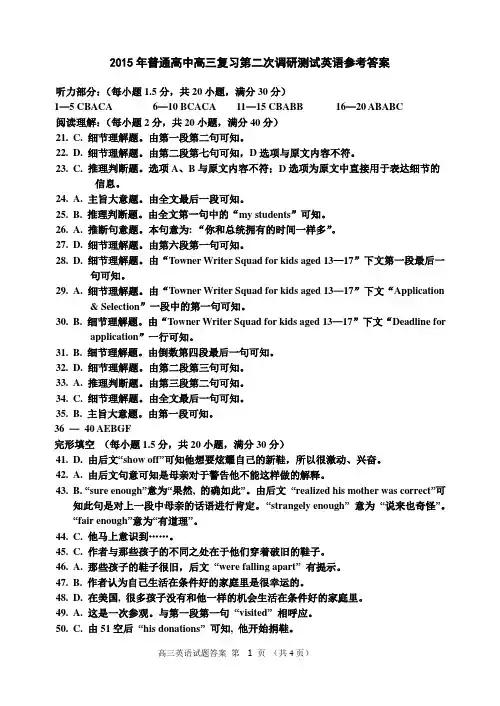
2015年普通高中高三复习第二次调研测试英语参考答案听力部分:(每小题1.5分,共20小题,满分30分)1—5 CBACA 6—10 BCACA 11—15 CBABB 16—20 ABABC阅读理解:(每小题2分,共20小题,满分40分)21.C. 细节理解题。
由第一段第二句可知。
22.D. 细节理解题。
由第二段第七句可知,D选项与原文内容不符。
23.C. 推理判断题。
选项A、B与原文内容不符;D选项为原文中直接用于表达细节的信息。
24.A. 主旨大意题。
由全文最后一段可知。
25.B. 推理判断题。
由全文第一句中的“my students”可知。
26.A. 推断句意题。
本句意为: “你和总统拥有的时间一样多”。
27.D. 细节理解题。
由第六段第一句可知。
28.D. 细节理解题。
由“Towner Writer Squad for kids aged 13—17”下文第一段最后一句可知。
29.A. 细节理解题。
由“Towner Writer Squad for kids aged 13—17”下文“Application& Selection”一段中的第一句可知。
30.B. 细节理解题。
由“Towner Writer Squad for kids aged 13—17”下文“Deadline forapplication”一行可知。
31.B. 细节理解题。
由倒数第四段最后一句可知。
32.D. 细节理解题。
由第二段第三句可知。
33.A. 推理判断题。
由第三段第二句可知。
34.C. 细节理解题。
由全文最后一句可知。
35.B. 主旨大意题。
由第一段可知。
36 —40 AEBGF完形填空(每小题1.5分,共20小题,满分30分)41.D. 由后文“show off”可知他想要炫耀自己的新鞋,所以很激动、兴奋。
42.A. 由后文句意可知是母亲对于警告他不能这样做的解释。
43.B. “sure enough”意为“果然, 的确如此”。
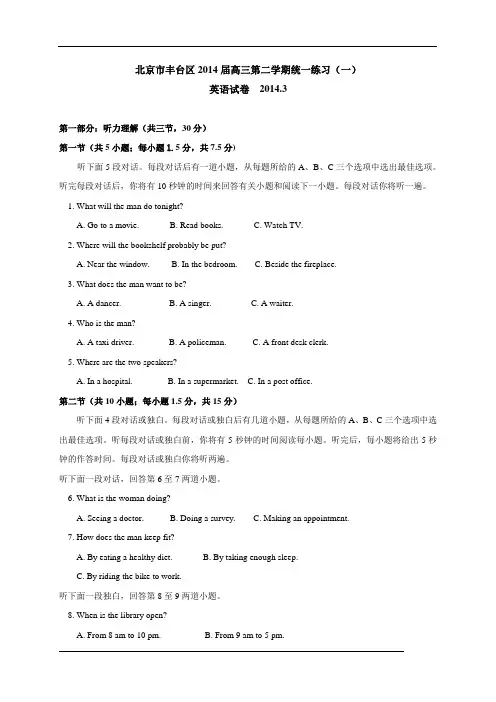
北京市丰台区2014届高三第二学期统一练习(一)英语试卷2014.3第一部分:听力理解(共三节,30分)第一节(共5小题;每小题l.5分,共7.5分)听下面5段对话。
每段对话后有一道小题,从每题所给的A、B、C三个选项中选出最佳选项。
听完每段对话后,你将有10秒钟的时间来回答有关小题和阅读下一小题。
每段对话你将听一遍。
1. What will the man do tonight?A. Go to a movie.B. Read books.C. Watch TV.2. Where will the bookshelf probably be put?A. Near the window.B. In the bedroom.C. Beside the fireplace.3. What does the man want to be?A. A dancer.B. A singer.C. A waiter.4. Who is the man?A. A taxi driver.B. A policeman.C. A front desk clerk.5. Where are the two speakers?A. In a hospital.B. In a supermarket.C. In a post office.第二节(共10小题;每小题1.5分,共15分)听下面4段对话或独白。
每段对话或独白后有几道小题,从每题所给的A、B、C三个选项中选出最佳选项。
听每段对话或独白前,你将有5秒钟的时间阅读每小题。
听完后,每小题将给出5秒钟的作答时间。
每段对话或独白你将听两遍。
听下面一段对话,回答第6至7两道小题。
6. What is the woman doing?A. Seeing a doctor.B. Doing a survey.C. Making an appointment.7. How does the man keep fit?A. By eating a healthy diet.B. By taking enough sleep.C. By riding the bike to work.听下面一段独白,回答第8至9两道小题。
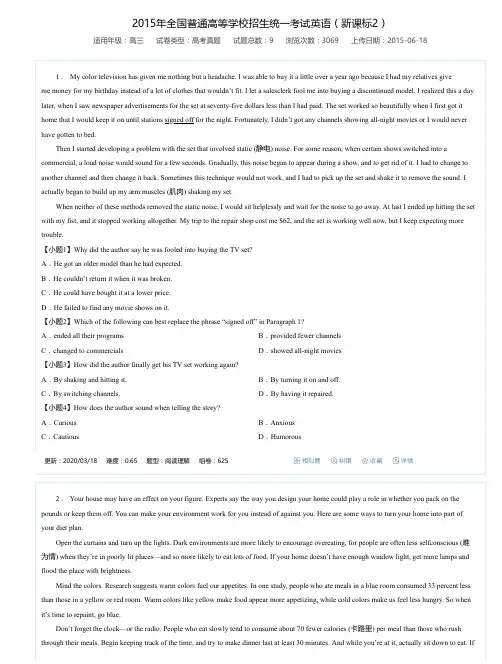
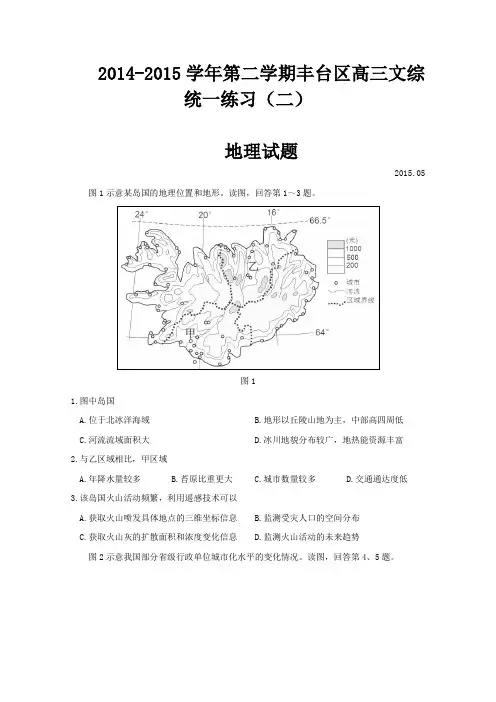
2014-2015学年第二学期丰台区高三文综
统一练习(二)
地理试题
2015.05 图1示意某岛国的地理位置和地形。
读图,回答第1~3题。
图1
1.图中岛国
A.位于北冰洋海域
B.地形以丘陵山地为主,中部高四周低
C.河流流域面积大
D.冰川地貌分布较广,地热能资源丰富
2.与乙区域相比,甲区域
A.年降水量较多
B.苔原比重更大
C.城市数量较多
D.交通通达度低
3.该岛国火山活动频繁,利用遥感技术可以
A.获取火山喷发具体地点的三维坐标信息
B.监测受灾人口的空间分布
C.获取火山灰的扩散面积和浓度变化信息
D.监测火山活动的未来趋势
图2示意我国部分省级行政单位城市化水平的变化情况。
读图,回答第4、5题。
图2
4.图中
A.东部省份的城市化水平较低
B.部分省份的城市出现逆城市化现象
C.西部省份进入城市化中期阶段
D.城市化水平与城市化速度呈正相关
5.在城市化过程中,北京市
A.绿地增加,人口合理容量变大
B.人口流动量大,管理难度增大
C.城区面积扩大,服务功能增大
D.劳力资源紧缺,退休年龄延迟
图3示意甲、乙两区域河流水系分布。
读图,回答第6、7题。
甲乙
图3
6.图中
A.甲区域比乙区域的比例尺大
B.乙区域在甲区域的西方
C.甲区域比以区域实地范围大
D.乙区域河流注入印度洋
7.图中。
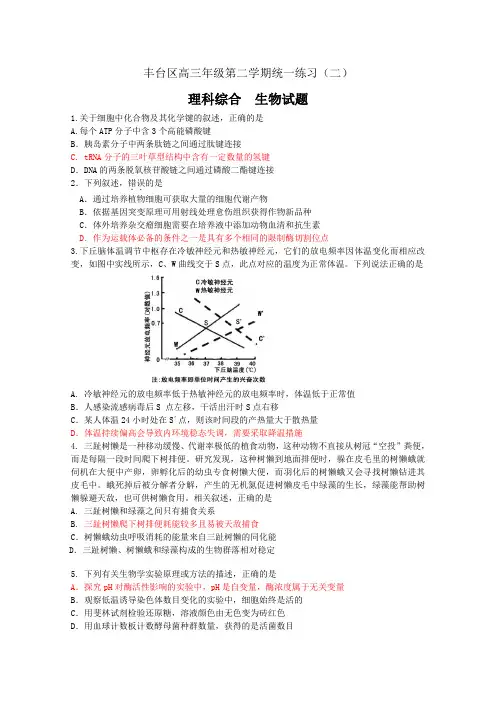
丰台区高三年级第二学期统一练习(二)理科综合生物试题1.关于细胞中化合物及其化学键的叙述,正确的是A.每个ATP分子中含3个高能磷酸键B.胰岛素分子中两条肽链之间通过肽键连接C. tRNA分子的三叶草型结构中含有一定数量的氢键D.DNA的两条脱氧核苷酸链之间通过磷酸二酯键连接2.下列叙述,错误..的是A.通过培养植物细胞可获取大量的细胞代谢产物B.依据基因突变原理可用射线处理愈伤组织获得作物新品种C.体外培养杂交瘤细胞需要在培养液中添加动物血清和抗生素D.作为运载体必备的条件之一是具有多个相同的限制酶切割位点3.下丘脑体温调节中枢存在冷敏神经元和热敏神经元,它们的放电频率因体温变化而相应改变,如图中实线所示,C、W曲线交于S点,此点对应的温度为正常体温。
下列说法正确的是A. 冷敏神经元的放电频率低于热敏神经元的放电频率时,体温低于正常值B.人感染流感病毒后S 点左移,干活出汗时S点右移C.某人体温24小时处在S´点,则该时间段的产热量大于散热量D.体温持续偏高会导致内环境稳态失调,需要采取降温措施4. 三趾树懒是一种移动缓慢、代谢率极低的植食动物,这种动物不直接从树冠“空投”粪便,而是每隔一段时间爬下树排便。
研究发现,这种树懒到地面排便时,躲在皮毛里的树懒蛾就伺机在大便中产卵,卵孵化后的幼虫专食树懒大便,而羽化后的树懒蛾又会寻找树懒钻进其皮毛中。
蛾死掉后被分解者分解,产生的无机氮促进树懒皮毛中绿藻的生长,绿藻能帮助树懒躲避天敌,也可供树懒食用。
相关叙述,正确的是A. 三趾树懒和绿藻之间只有捕食关系B. 三趾树懒爬下树排便耗能较多且易被天敌捕食C.树懒蛾幼虫呼吸消耗的能量来自三趾树懒的同化能D.三趾树懒、树懒蛾和绿藻构成的生物群落相对稳定5. 下列有关生物学实验原理或方法的描述,正确的是A.探究pH对酶活性影响的实验中,pH是自变量,酶浓度属于无关变量B.观察低温诱导染色体数目变化的实验中,细胞始终是活的C.用斐林试剂检验还原糖,溶液颜色由无色变为砖红色D.用血球计数板计数酵母菌种群数量,获得的是活菌数目29.(18分)生长素(IAA)和赤霉素(GA) 是调节植物茎伸长生长的两类主要植物激素。
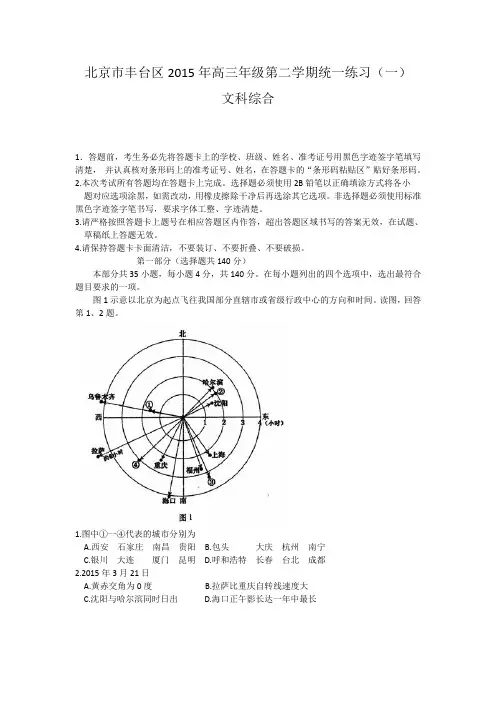
北京市丰台区2015年高三年级第二学期统一练习(一)文科综合1.答题前,考生务必先将答题卡上的学校、班级、姓名、准考证号用黑色字迹签字笔填写清楚,并认真核对条形码上的准考证号、姓名,在答题卡的“条形码粘贴区”贴好条形码。
2.本次考试所有答题均在答题卡上完成。
选择题必须使用2B铅笔以正确填涂方式将各小题对应选项涂黑,如需改动,用橡皮擦除干净后再选涂其它选项。
非选择题必须使用标准黑色字迹签字笔书写,要求字体工整、字迹清楚。
3.请严格按照答题卡上题号在相应答题区内作答,超出答题区域书写的答案无效,在试题、草稿纸上答题无效。
4.请保持答题卡卡面清洁,不要装订、不要折叠、不要破损。
第一部分(选择题共140分)本部分共35小题,每小题4分,共140分。
在每小题列出的四个选项中,选出最符合题目要求的一项。
图1示意以北京为起点飞往我国部分直辖市或省级行政中心的方向和时间。
读图,回答第1、2题。
1.图中①一④代表的城市分别为A.西安石家庄南昌贵阳B.包头大庆杭州南宁C.银川大连厦门昆明D.呼和浩特长春台北成都2.2015年3月21日A.黄赤交角为0度B.拉萨比重庆自转线速度大C.沈阳与哈尔滨同时日出D.海口正午影长达一年中最长图2示意2014年8月24日南京市城区两个监测点地表短时流量监测数据统计。
读图,回答第3、4题。
3.据图中数据可推断A.该日午后暑热程度有所减轻B.地表短时流量变化与降水量变化同步C.南京正值阴雨连绵的梅雨季节D.甲测点附近植被覆盖率比乙测点附近高4.图中监测数据可用于A.分析大气湿度,评估环境质量B.估算雨水可回收量,增加城市供水来源C.监测流量变化,做好防洪准备D.提供实时气象预报,保障市民出行安全图3示意南岭以南某区城等高线分布。
读图,回答第5、6题。
5.图中景区A.流水潺潺,奇峰耸立B.山林茂密,空气清新C.青山飞瀑,云雾缭绕D.湖光山色,翠竹参天6.图示区域农业可持续发展的最合理措施是A.修建梯田,扩大水稻种植面积B.封山育林,改善当地生态环境C.退耕还林还草,发展畜牧生产D.调整农业结构,发展立体农业7.新疆维吾尔学科网自治区A.春季出现3个大风日数大于40天的高值中心B.夏季高值区域的大风日数较春季有所减少C.南部地区秋季大风日数为四季中最少D.冬季西北部地区大风日数最多8.新疆南部地区大风日数较少的主要原因是A.纬度位置较低B.周围有高大山脉C.沙漠面积广,地表粗糙D.降水少,太阳辐射强烈产自智利圣地亚哥附近的车厘子,色泽紫红、颗拉硕大,是近年来北京春节市场上的热销水果。
丰台区2015年高三年级第二学期统一练习(二) 2015.5数学(理科)第一部分 (选择题 共40分)选择题共8小题,每小题5分,共40分.在每小题列出的四个选项中,选出符合题目要求的一项. 1.已知{1}A x x =>,2{20}B x x x =-<,则AB =(A){0x x <或1}x ≥(B) {12}x x <<(C){0x x <或1}x > (D) {0}x x >2.“a =0”是“复数i z a b =+(a ,b ∈R)为纯虚数”的(A) 充分不必要条件 (B) 必要不充分条件 (C) 充分必要条件 (D) 既不充分也不必要条件 3.直线4y x =+与曲线21y x x =-+所围成的封闭图形的面积为(A)223(B)283(C)323(D)3434.函数1,0,()2cos 1,20x f x x x ≥=--π≤<⎪⎩的所有零点的和等于(A) 1-2π (B) 312π-(C) 1-π(D) 12π-5.某三棱锥的正视图和俯视图如图所示,则其左视图面积为(A) 6 (B)29 (C) 3(D) 236.平面向量a 与b 的夹角是3π,且1a =,2b =,如果AB a b =+,3AC a b =-,D 是BC 的中点,那么AD =(A)(B) (C) 3 (D) 67.某生产厂家根据市场调查分析,决定调整产品生产方案,准备每周(按5天计算)生产A ,B ,C 三种产品共15吨(同一时间段内只能生产一种产品),已知生产这些产品每吨所需天数和每吨产值如下表:则每周最高产值是(A) 30(B) 40 (C) 47.5(D) 52.5俯视图正视图8.抛物线24y x =的焦点为F ,经过F 的直线与抛物线在x 轴上方的部分相交于点A ,与准线l 交于点B ,且AK l ⊥于K ,如果||||AF BF =,那么AKF △的面积是 (A) 4(B)(C) (D) 8第二部分 (非选择题 共110分)一、填空题共6小题,每小题5分,共30分.9.已知正实数x ,y 满足3xy =,则2x y +的最小值是 . 10.直线l 的斜率是1-,且过曲线22cos ,32sin x y θθ=+⎧⎨=+⎩(θ为参数)的对称中心,则直线l 的方程是 .11.已知函数21()sin 22f x x x =+,则()f x 的最小正周期是 ;如果()f x 的导函数是()f x ',则()6f π'= . 12.执行如图所示的程序框图,则输出的结果是 .13.如图所示,△ABC 内接于⊙O ,PA 是⊙O 的切线,PB PA ⊥,24BE PE PD ===,则PA =_____,AC = .14. 已知非空集合A ,B 满足以下四个条件:①{1,2,3,4,5,6,7}A B =;②A B =∅;③A 中的元素个数不是A 中的元素;④B 中的元素个数不是B 中的元素.(ⅰ)如果集合A 中只有1个元素,那么A =______; (ⅱ)有序集合对(A ,B )的个数是______.二、解答题共6小题,共80分.解答应写出文字说明,演算步骤或证明过程.15.(本小题共13分)在△ABC 中,30A ︒=,52=BC ,点D 在AB 边上,且BCD ∠为锐角,2CD =,△BCD 的面积为4.(Ⅰ)求cos BCD ∠的值; (Ⅱ)求边AC 的长.16.(本小题共13分)长时间用手机上网严重影响着学生的健康,某校为了解A ,B 两班学生手机上网的时长,分别从这两个班中随机抽取6名同学进行调查,将他们平均每周手机上网时长作为样本数据,绘制成茎叶图如图所示(图中的茎表示十位数字,叶表示个位数字).如果学生平均每周手机上网的时长超过21小时,则称为“过度用网”.(Ⅰ)请根据样本数据,分别估计A ,B 两班的学生平均每周上网时长的平均值;(Ⅱ)从A 班的样本数据中有放回地抽取2个数据,求恰有1个数据为“过度用网”的概率;(Ⅲ)从A 班、B 班的样本中各随机抽取2名学生的数据,记“过度用网”的学生人数为ξ,写出ξ的分布列和数学期望ξE .17.(本小题共14分)如图所示,在四棱柱1111D C B A A B C D-中,⊥1AA 底面A B C D ,BD AC ⊥于O ,且124AA OC OA ===,点M 是棱1CC 上一点.(Ⅰ)如果过1A ,1B ,O 的平面与底面ABCD 交于直线l ,求证://l AB ; (Ⅱ)当M 是棱1CC 中点时,求证:1AO DM ⊥; (Ⅲ)设二面角1A BD M --的平面角为θ,当cos θ=CM 的长.18.(本小题共13分)OMD 1C 1B 1A 1DCBAA 班B 班 0 1 2 39 1 0 73 41 1 62 57已知数列{}n a 满足110a =,1212,2,1log ,21n a n n n k a a n k --⎧==⎨-+=+⎩*(N )k ∈,其前n 项和为n S .(Ⅰ)写出3a ,4a ;(Ⅱ)求数列{}n a 的通项公式; (Ⅲ)求n S 的最大值.19.(本小题共14分)已知椭圆C :22221(0)x y a b a b+=>>的焦距为2,其两个焦点与短轴的一个顶点是正三角形的三个顶点.(Ⅰ)求椭圆C 的标准方程;(Ⅱ)动点P 在椭圆C 上,直线l :4x =与x 轴交于点N ,PM l ⊥于点M (M ,N 不重合),试问在x 轴上是否存在定点T ,使得PTN ∠的平分线过PM 中点,如果存在,求定点T 的坐标;如果不存在,说明理由.20.(本小题共13分)已知函数ln 1()ax f x x+=(0a >). (Ⅰ)求函数()f x 的最大值;(Ⅱ)如果关于x 的方程ln 1x bx +=有两解,写出b 的取值范围(只需写出结论);(Ⅲ)证明:当*N k ∈且2k ≥时,1111lnln 2234k k k<+++⋅⋅⋅+<.(考生务必将答案答在答题卡上,在试卷上作答无效)丰台区2015年高三年级第二学期数学统一练习(二)数 学(理科)参考答案一、填空题:本大题共6小题,每小题5分,共30分.9. 10.50x y +-= 11.π;1-12.212213.4; 14.{6};32 注:第11,13,14题第一个空填对得3分,第二个空填对得2分. 二、解答题:15.(本小题共13分) 解:(Ⅰ)因为1sin 42BCD S BC CD BCD ∆=⋅⋅∠=, 所以552sin =∠BCD . 因为BCD ∠为锐角,所以cos BCD ∠==……………………6分 (Ⅱ)在BCD ∆中,因为BCD BC CD BC CD DB ∠⋅⋅-+=cos 2222,所以4=DB . 因为222BC CD DB =+,所以︒=∠90CDB .所以ACD ∆为直角三角形.因为30A ︒=,所以24AC CD ==,即4AC =. ……………………13分16.(本小题共13分)解:(Ⅰ)A 班样本数据的平均值为1(91113202437)196+++++=, 由此估计A 班学生每周平均上网时间19小时; B 班样本数据的平均值为1(111221252736)226+++++=, 由此估计B 班学生每周平均上网时间22小时. ……………………2分 (Ⅱ)因为从A 班的6个样本数据中随机抽取1个的数据,为“过度用网”的概率是13, 所以从A 班的样本数据中有放回的抽取2个的数据,恰有1个数据为“过度用网”的概率为12124()()339P C =⨯=. ……………………5分 (Ⅲ)ξ的可能取值为0,1,2,3,4.252)0(26262324===C C C C P ξ, 7526)1(2626131324231214=+==C C C C C C C C P ξ, 7531)2(26261313121423242322=++==C C C C C C C C C C P ξ, 7511)3(2626231214131322=+==C C C C C C C C P ξ, 751)4(26262322===C C C C P ξ. ξ的分布列是:2263111150123425757575753E ξ=⨯+⨯+⨯+⨯+⨯=. ……………………13分17.(本小题共14分)证明:(Ⅰ)因为1111D C B A ABCD -是棱柱,所以BA B A 11是平行四边形.所以AB B A //11.因为⊄11B A 平面ABCD ,⊂AB 平面ABCD ,所以//11B A 平面ABCD .因为平面 O B A 11平面ABCD l =,所以11//B A l . 所以AB l //.………………4分 (Ⅱ)因为DB AC ⊥于O ,如图建立空间直角坐标系.因为41=AA ,且24OC AO ==,所以(0,0,0)O ,(4,0,0)C ,(2,0,0)A -,1(2,0,4)A -.因为M 是棱1CC 中点,所以(4,0,2)M .B设(0,,0)D b ,所以(4,,2)DM b =-,1(2,0,4)OA =-. 所以08081=++-=⋅.所以1AO DM ⊥. ……………………8分 (Ⅲ)设(0,,0)D b ,(0,,0)B c ,平面BD A 1的法向量为),,(z y x m =,又因为1(2,,4)AD b =-,1(2,,4)AB c =-,所以1102402400m A D x by z x cy z m A B ⎧⋅=+-=⎧⎪⇒⎨⎨+-=⋅=⎩⎪⎩. 因为c b ≠,所以0=y ,令1z =,则2x =,所以(2,0,1)m =. 设),0,4(h M ,所以(4,,)MD b h =--,(4,,)MB c h =--. 设平面MBD 的法向量为111(,,)n x y z =,所以 111111400400x by hz n MD x cy hz n MB ⎧-+-=⋅=⎧⎪⇒⎨⎨-+-=⋅=⎩⎪⎩.因为c b ≠,所以10y =,令11z =,则14h x =-,所以(,0,1)4hn =-.又因为cos 25θ=, 所以2cos ,25m n<>=,即125m nn m⋅==解得3h =或76h =. 所以点(4,0,3)M 或7(4,0,)6M .所以3CM =或76CM =. ……………………14分18.(本小题共13分) 解:(Ⅰ)因为110a =,所以110222a a ==,1032221log 1log 29a a =-+=-+=,942512a ==. ……………………3分(Ⅱ)当n 为奇数时,221221log 1log 21n a n n n a a a ---=-+=-+=-,即21n n a a --=-.所以{}n a 的奇数项成首项为110a =,公差为1-的等差数列. 所以当n 为奇数时,1121()(1)22n n na a --=+⋅-=. 当n 为偶数时,121(1)1122222n n n n a a ----===,所以 112*2,2,(N )21,2 1.2nn n k a k n n k -⎧=⎪=∈⎨-⎪=-⎩ ……………………10分 (Ⅲ)因为偶数项11220n n a -=>,奇数项212n na -=为递减数列, 所以n S 取最大值时n 为偶数. 令2210k k a a -+≥(*N k ∈), 即112121202kk --++≥. 所以11211k k -≥-.得11k ≤.所以n S 的最大值为1091022(2222)(1090)2102S =++++++++=.……………………13分19.(本小题共14分) 解:(Ⅰ)因为椭圆C 的焦距22c =,所以1c =. 因为两个焦点与短轴的一个顶点构成正三角形,所以b =2a .所以椭圆C 的标准方程为22143x y +=. ……………………4分 (Ⅱ)假设存在点T ,使得PTN ∠的平分线过PM 中点.设00(,)P x y ,(,0)T t ,PM 的中点为S .因为PM l ⊥于点M (M ,N 不重合),且PTN ∠的平分线过S ,所以PTS STN PST ∠=∠=∠. 又因为S 为PM 的中点,所以12PT PS PM ==.0142x =-.因为点P 在椭圆C 上,所以2203(1)4x y =-,代入上式可得 202(1)(1)0x t t -+-=.因为对于任意的动点P ,PTN ∠的平分线都过S , 所以此式对任意0(2,2)x ∈-都成立. 所以21010t t -=⎧⎨-=⎩,解得1t =. 所以存在定点T ,使得PTN ∠的平分线过PM 中点,此时定点T 的坐标为(1,0). ……………………14分20.(本小题共13分)解:(Ⅰ)函数的定义域为{0}x x >.因为ln 1()ax f x x +=, 所以2ln ()axf x x -'=.因为0a >,所以当()0f x '=时,1x a=.当1(0,)x a∈时,()0f x '>,()f x 在1(0,)a 上单调递增;当 1(,)x a∈+∞时,()0f x '<,()f x 在1(,)a +∞上单调递减.所以当1x a=时,1()()f x f a a ==最大值. ……………………6分(Ⅱ)当01b <<时,方程ln 1x bx +=有两解. ……………………8分(Ⅲ)由(Ⅰ)得ln 11x x +≤,变形得11ln x x-≤,当1x =等号成立.所以 11ln 22-<,231ln 32-<,……11ln 1k kk k --<-, 所以得到 当*N k ∈且2k ≥时,1111ln 234k k+++⋅⋅⋅⋅⋅⋅+<. ……………………10分 由(Ⅰ)得ln 11x x+≤,变形得 ln 1x x ≤-,当1x =等号成立.所以 33ln122<-, 44ln 133<-, 55ln 144<-,……11ln1k k k k++<-, 所以得到 当*N k ∈且2k ≥时,11111ln2234k k+<+++⋅⋅⋅⋅⋅⋅+. 又因为1lnln 22k k +<, 所以当*N k ∈且2k ≥时,1111lnln 2234k k k<+++⋅⋅⋅⋅⋅⋅+<. ……………………13分(若用其他方法解题,请酌情给分)。
2015北京市丰台区高三(一模)英语一、单选题(共15小题)1.(3分)His early comedies were filmed________black and white.()A.of B.with C.in D.by2.(3分)I'm not sure where my necklace is,but I have a pretty good idea who________it.()A.take﹣B.took C.had taken﹣D.will take3.(3分)__________most people come here for skiing,there are plenty of other things to do.()A.Although﹣B.Once C.Since﹣D.If4.(3分)The food_______in this way keeps fresh.()A.prepare B.preparing C.to prepare D.prepared5.(3分)_________to the house owner,the designer had a clear idea of what to do.()A.To talk B.TalkedC.Having talked D.Being talked6.(3分)My office wasn't far from Chinatown,________I found some very good Chinese restaurants.()A.which B.whose C.when D.where7.(3分)Whenever I'm in trouble,I hear a voice ________ in my head"You can do it".()A.to ring﹣B.ringing C.rung﹣D.having rung8.(3分)With a little more care,you________the traffic'accident.It's lucky that you just hurt your arm.()A.can avoid﹣B.arrivedC.had avoided﹣D.could have avoided9.(3分)Sam's bakery________a partnership with a local coffee company.Now they serve great coffee.()A.has formed﹣ B.would form C.is forming﹣ D.will form10.(3分)The book I wrote last year_________and it will soon come out.()A.printed B.will printC.was printed D.is being printed11.(3分)________online courses can produce good results remains to be seen.()A.That﹣B.Whether C.Who﹣D.Where12.(3分)﹣﹣﹣Excuse me,where can I get my car filled up?﹣﹣﹣There are gas stations at________end of the block.()A.both B.neither C.either D.all13.(3分)Wonderful Friends,a show on Hunan TV,is about _________people get along with animals.()A.how B.what C.why D.who14.(3分)The road_______next week leads to Highway 62.()A.building B.to build C.to be built D.built15.(3分)Although the test________look like a simple one,great care is needed.()A.may B.must C.should D.need二、完形填空(共1小题)16.阅读下面短文,掌握其大意,然后从1﹣20各题所给的四个选项(A、B、C和D)中,选出最佳选项.Though she had been in a coma(昏迷)for nearly six months,it was still a(16)when my grandmother passed away.I was not yet thirteen when she(17).I'd understood that death awaited her,but in those first moments of knowing,I could not(18)that"eventually"had finally come to pass.Friends came to the funeral home to pay their last respects to my grandmother and to show their support for my mother.Not(19)where to be or what to do,I stayed off to the side.The(20)finally ended with the arrival of my friend Kelly.Kelly and I had been friends ever since she was three and Four.We were"home"friends,the kind who rode bikes together after school,went(21)to a KFC a few blocks away,even though we weren't allowed to leave the block.At the funeral home,Kelly came right to me.In her hands were two packages of M&M's.Kelly knew that was one of my(22).We had often taken long trips to the store for(23).We sat in the back,eating M&M's and talking quietly.A(24)experience had suddenly become easier to bear,with a childhood offering of chocolates and the(25)of a devoted friend.Trying to come up with something to offer a heartbroken person is(26).Kelly had understood,even at twelve,that there wasn't much she could do to reduce my pain(27)be there with me and bring something that just might make me(28).Now,whenever Kelly and I find ourselves at funeral home for family member of ours,the other has always shown up(29)M&M's,a small offering of(30)to take the edge off the hovering sorrow.We've(31)that when we're old,the one who dies first will have a crazy old lady throwing M&M's into her grave.M&M's will(32)be significant to me.They will(33)me that even when something as painful and powerful as(34)comes to claim what's most important to me,ther e will always be Kelly…and her chocolate.M&M's,melt(溶解)in your(35),not in your hand.16.A.shock B.topic C.story D.custom17.A.returned B.died C.cried D.recovered18.A.tell B.pretend C.find D.believe19.A.knowing B.seeing C.guessing D.planning20.A.activity B.introduction C.ceremony D.awkwardness21.A.directly B.separately C.secretly D.hurriedly22.A.collections B.favorites C.presents D.choices23.A.dolls B.pens C.dresses D.chocolates24.A.valuable B.familiar C.painful D.previous25.A.duty B.dream C.company D.greeting26.A.strange B.clever C.difficult D.reasonable27.A.but B.or C.so D.and28.A,think B.wonder C.smile D.jump29.A.for B.with C.at D.by30.A.cheer B.excitement C.reward D.patience31.A.worried B.remembered C.suspected D.joked32.A.even B.always C.also D.merely33.A.warm B.promise C.recur D.remind34.A.darkness B.pressure C.death D.failure35.A.mouth B.heart C.arms D.eyes.三、阅读理解(共4小题)阅读下面短文,从每题所给的四个选项(A、B、C和D)中,选出最佳选项.36.Sunshine Sports CentreOne of the most modem sports centers in town,the Sunshine Sports Centre is not just a sports club but much more!FacilitiesWith a swimming pool for adults and teens,and a smaller one for children,our centre has something for all the members of the family.Parents can relax while children play in the water.For anybody who is interested in competitive sports,our volleyball,tennis and basketball courts are the ideal place to work off stress.Whether you just want to keep in shape,lose some weight or build your strength,there's the gym with its super﹣modem equipment and three personal trainers to look after you and answer all your questions.They can also give you general advice about healthy eating and dieting.LessonsIt doesn't matter if you're five or eighty﹣five,there's something for you at the Sunshine Sports Centre!We offer personal training in all sports if you want it,but there are also group lessons for all sports if you prefer teamwork.Kids and teenagersTake advantage of our special offer for younger members.For members between five and sixteen years old,there are special lessons in water polo,competitive swimming and diving.There are many classes for all levels of swimmers,with a lifeguard on duty from 9:00 am when the pool opens until it closes at 7:00 pm.Social eventsSunshine Sports Centre is not only for sport!You can enjoy a delicious meal at our restaurant or have a milkshake with your friends on the balcony overlooking the swimming pool and the courts.In addition,there are lovely gardens where families or friends can have a picnic!To celebrate a birthday,there is no better place than the Sunshine Sports Centre.So,come on Sign up for Sunshine Sports Centre today!36.In Sunshine Sports CentreA.people can have birthday partiesB.lifeguards are on duty 24 hours a dayC.children are not allowed to swim aloneD.special lessons in diving are offered to adults37.People can ask personal trainers for advice when theyA.learn to swimB.sign upC.build strengthD.play basketball38.The main purpose of the passage is toA.explain the rules of the sports centreB.attract people to the sports centreC.persuade people to play sportsD.show the benefits of sports.39.I've always felt a bit sad for weekend fathers,who are divorced and must maintain a bond with their children through visits on the weekend.Not having the opportunity for a lot of quality time,they go in for quantity﹣giving lots of gifts and taking the children on non﹣stop outings.But now I can understand.I'm a weekend mom.My child,Henry,is a dog.Henry just returned to his father,Jack,after a happy stay with me.For ten days,I fed him the best food,canceled plans to stay home with him and let him sleep on the bed every night.Jack and I broke up a year ago.But neither of us wanted to part with Henry,so we share him.Not surprisingly,Henry is a willing participant in our contest for his love.Jack doesn't let Henry sleep on his bed,so that's where I can always gain big points.I feed Henry higher﹣quality food.I am always replacing his expensive"thingy",a cotton knot he likes chewing on.It's his favorite toy,and the only one he has is at my house.Score another one for me.Jack now has a girlfriend,Lucy.At first she was afraid﹣of dogs,which secretly delighted me.But that Henry,just trying to be polite(the way I taught him to be),won her over.If truth be told,as time passes,there has been a slight change in Henry's behavior toward me.The worst was one day when Jack dropped him off for a two﹣week stay.Henry and I were in the backyard playing as Jack was driving off.When he heard Jack's truck,he ran after it for two blocks until Jack had to stop and bring him back.That hurt,especially since I had friends over at the time.In a rare conciliatory (安抚的) mood,Jack said to me,"You know,I'm his best friend,but you'll always be his mom."Whatever it takes,I plan to make sure it stays that way.39.At the writer's home,Henry .A.does a lot of runningB.enjoys high﹣quality foodC.has many expensive toysD.is not allowed to sleep on her bed40.The writer feels hurt because .A.Jack has got a girlfriendB.Lucy doesn't like Henry at allC.Jack doesn't treat Henry as well as beforeD.Henry's attitude to her has changed slightly41.This article is mainly about .A.the tips on keeping dogsB.the writer's happy life with a dogC.the writer's efforts to win a dog's loveD.the relationship between the writer and Jack42.The writer wrote the passage in a/an way.A.humorousB.serousC.angryD.painful.43.This is a story told or read to children of young ages.The heroine(女主人公),Cinderella,treated cruelly by her stepmother and her two ugly stepsisters,is helpless until the right magic comes along.She meets her prince and they live together happily.Just a sweet,pretty tale?Not in the view of Ellen Macintosh,who has written much about fairy tales.Ellen's main concern is with what the story implies."Instead of standing up to her cruel stepmother and stepsisters,Cinderella just waits for a fairy godmother to appear and solve her problem.But wouldn't you want a daughter of yours to show more spirit?"The story is long﹣lasting,whatever its shortcomings,and it does't take much to see its influence on a number of recent Hollywood productions.In these versions for the silver screen,the Cinderella character no longer has to clean the house and has no sisters to make her life terrible,though she keeps the way of not showing much courage.The character of the rich and handsome stranger,however,is kept,and in some cases really is a prince.The role of the fairy godmother is often played by luck; we live in a civilized age when even very young children might reject the idea of fairies.In the majority of film versions,the heroine has a profession and is even permitted to continue working after marrying her prince﹣this is the twenty first century,after all.Doesn't the success of these films indicate that the story has relevance to children even today?"Yes,admits Ellen,who sees its message as being rooted in a fundamental childhood desire for love and attention."Most children experience a sense of inner loneliness as they are growing up and empathize with (与…共鸣)the character who faces some sort of challenge.This can be seen in the original story of Cinderella,where the fairy godmother tells the heroine that she must learn to be gracious and confident if she is to go to the ball.She has to grow spiritually,and by maturing,she becomes attractive tothe prince,thus ensuring that the ending of the story will be happy.""In the later versions,thus element (因素)is missing,"says Ellen,"and the theme of the story is simply that a girl's role in life is to be more beautiful than other girls so that she can carry off the prize:the handsome prince.Is this really what we want girls to grow up believing?"43.Why does Ellen disapprove of the Cinderella story?A.The plot is too simple.B.The description is not vivid.C.The heroine is not brave enough.D.The story is unfit for the children today.44.In the film versions of the Cinderella story,.A.luck plays an important role in the heroine's happy lifeB.Cinderella's family background remains unchangedC.the heroine becomes a successful career womanD.the character of the prerace is removed.45.According to Even,the film versions of the storyA.succeed because of the happy endingB.ignore the children's psychological need'C.deliver a mistaken message that beauty is everythingD.reflect modem people's attitude towards challenges in life46.What is the purpose of the passage?A.To analyze the characters of the Cinderella story.B.To introduce different versions of the Cinderella story.C.To explain the changes of the Cinderella story over time.D.To present a different understanding of the Cinderella story.47.School Counseling(咨询)In our grandparents'time,it was unthinkable.In our parents'time,it was unusual and nobody spoke openly about counseling.These days,more and more schools are asking for this service and it is considered a necessity for most.Why is it?What has changed in the last fifty years to have made counseling at schools so important?"One reason is that we expect schools to do more to protect their pupils than we did in the past,"says school counselor,Mike Hudson."Also,our society doesn't work as well as it should.Many parents areeither under pressure of work or face the economic problems of unemployment,while children are under more and more pressure to do well at school.Many pupils feel they are pushed to their limits by their parents and teachers."Most school children face some kind of relationship problem at some stage with family members,teachers or other pupils,so.it helps to have somebody to talk to.From the pupil's point of view,it is easier to talk to a counselor in confidence rather than a family member or teacher.This solution is less embarrassing to pupils,who are not forced to face the person that they had problems with in the first place.They can calmly talk things through without arguments.School counselors advise not only students but also their teachers and parents,and offer other services as well,such as deciding learning disabilities or assisting parents and guardians to make the correct decisions about their children's education.Counselors can help students with problems ranging from the most serious,like a death in the family,to what an adult would consider really trivial,like an argument with a friend.In a society that is becoming more and more stressful,this service is providing children with a supportive way to express their fear and worries.47.Why is school counseling becoming important?A.Pupils are not well protected in school.B.Parents can't help their children in learning.C.Parents and pupils are under too much pressure.D.The relationship between parents and schools is worse.48.According to the passage,school counselors .A.bear high pressure themselvesB.are the guarantee of school successC.have more responsibilities than teachersD.are more likely to be accepted when pupils have problems49.The underlined word"trivial"in Para.5 probably means .A.unimportantB.puzzlingC.difficultD.urgent50.What does the passage mainly talk about?A.The development of school counseling.B.The reasons for school counseling's popularity.C.The advantages and disadvantages of school counseling.D.The comparison of the past and present school counseling.四、信息匹配(共1小题)51.根据短文内容,从短文后的选项中选出能填人空白处的最佳选项.选项中有两项为多余选项.Personal ShoppersI was shopping with Thomas,who has been working as a personal shopper for the past five years."Personal shoppers are in great demand these days,"he told me as we were walking past designer clothes shops.(51)He said that there were many people who wanted to be fashionable,but they didn't know where to start.They needed a professional to advise them.But why?I always call my best friend to help me find the perfect dress,not a stranger! "(52) The first thing I do is help my customer improve their image.I teach them to choose colours and clothes that suit them,and how to use make﹣up,"Thomas told me."Then I organize the customer's wardrobe.(53)The third service has to do with actual shopping:the personal shopper and the customer visit shops and buy clothes according to the customer's personality,lifestyle and needs."Of course,each of the above services costs between 150 and 225 euros!(54)"Most of my customers are rich business people who call me for important meetings or business parties,"explained Thomas."However,I also work for people in all kinds of jobs and for retired men and women who want a change of look."We spent the rest of the day shopping.Every time we came out of a shop,we had one more bag.In the end,I went home with a beautiful dress,two pairs of trousers,some lovely tops and a couple of coats.I'd never had a shopping day like this before!I admit that I'd spent more than I usually do,but I wouldn't have found such beautiful clothes without Thomas.(55)A.I can help in three different ways.B.I asked him why this had happened.C.It depends on the customer's preferences.D.I might even throw away some old clothes.E.I just wish personal shoppers were a bit cheaper!F.People need help with choosing the right clothes.G.I just wonder how many people have this kind of money to spend.五、书面表达(共2小题)56.请你代表2015届高三学生给外教Jeff写一封电子邮件,内容包括:1.邀请他参加2015届高三年级的成人仪式;2.请他做简短发言;3.时间:3月30日(周一)下午3:30;4.地点:学校礼堂.注意:1.词数不少于50.2.可适当增加细节,以使行文连贯.3.开头和结尾已给出,不计入总词数.提示词:成人仪式the Coming﹣of﹣age ceremonyDear Jeff,Yours,Li Hua.57.假设你是红星中学2015届高三(1)班学生李华,请根据以下四幅图的先后顺序,为校刊"英语园地"写一篇短文,记述你和家人欢度元宵节(the Lantern Festival)的过程.注意:1.词数不少于60.2.短文开头已给出,不计人总词数.提示词:汤圆sweet dumpling;灯笼lanternThe Lantern Festival of this year fell on March 5th..英语试题答案一、单选题(共15小题)1.【解答】答案C.介词"in+颜色"表示"带着…颜色",再根据句子所表达的意思"喜剧被拍成黑白色"可知答案应选用in,故选择C.其他的介词无此用法,故其他选项可全部排除.2.【解答】答案B根据but可知,两个并列句构成转折关系,因此我不清楚项链在哪("I'm not sure where my necklace is")是"现在状态",有人把项链拿走了("who took it")是"过去动作",因此用一般过去时.故选B项.3.【解答】答案A.although尽管,虽然,引导让步状语从句;once一旦,引导时间或条件状语从句;since因为,引导原因状语从句;if如果,引导条件状语从句.从句与主句在逻辑上构成让步状语关系,因此选从属连词,虽然"Although",故答案选A.4.【解答】答案:D.本题中已有谓语动词keeps,故prepare必须以非谓语动词出现,"___ in this way"在句中做后置定语,而动词"prepare"(准备)与它的逻辑主语"the food"(食物)之间构成"被动完成"关系,即被这样准备的食物("The food prepared in this way"),因此用过去分词.5.【解答】答案:C题干中talk与主语the designer之间构成主谓关系,要用主动;句意表达的talk动作发生在had之前,要用完成式.故选C.6.【解答】答案D.分析定语从句"________I found some very good Chinese restaurants."的句子成分可知,从句中不缺主语和宾语,故可以排除关系代词A和B;Chinatown是定语从句的先行词,是一个表示地点概念的名词,只能用where来引导定语从句,在从句中做地点状语,where=in which;先行词后面有逗号,所以where引导的是一个非限制性定语从句,故答案选D.7.【解答】答案B句子的逻辑主语声音"a voice"与非谓语动词振响"ring"之间构成主动关系,即声音此时正在振响,因此用现在分词一般式.故选B项.8.【解答】答案D.由句意可知本题考查虚拟语气.根据后面的语境"It's lucky that you just hurt your arm."可知虚拟部分是对过去事实的虚拟,因此用could+have done表示本能做(实际未做).可将句子转化成if引导的非真实条件句:If you had been with a little more care,you could have avoided the traffic accident.所以答案选D.9.【解答】答案:A.根据句意可知动作form(形成、达成)已经发生并持续到现在,对现在现在造成影响"now they serve great coffee",所以该动词应用现在完成时,have+done,选A.10.【解答】答案D.根据句子的主语the book与动词print之间是逻辑上的被动关系,可以排除A和B两项;根据句子所表达的意思可知,print这一动作正在进行,所以该动词应该使用现在进行时的被动动态.故答案选D.11.【解答】答案:B.本句的谓语部分是"…remains to be seen(拭目以待),可推知前面的部分为一个表示疑问的主语从句,根据句意"网上课程是否能取得好效果"可知选用whether;故答案为B.12.【解答】答案C.both两者都,且both+复数名词;neither两者都不的;either两者中任何一方的;all三者或三者以上全部的.本句用either end of the block,即在路的任何的一端.根据句子所表达的意思可知答案选C.13.【解答】答案A.通过分析可知"_________people get along with animals."是宾语从句,做介词about的宾语.从句中不缺主语和宾语,可排除B和D两项;连接副词how的意思是"如何";连接副词why的意思是"为什么".根据句子所表达的意思可知答案选A.14.【解答】答案:C.本题中"_____ next week"在句中做the road的后置定语,根据next week(下周)可知修建(build)在将来发生,用不定式来表将来,且动词修建("build")与它的逻辑主语这条路("the road")之间构成被动关系,应用被动态,故本题用不定式的被动态﹣to+be done(to be built).15.【解答】答案A.may表示也许,或许;must一定是;should应该是;need没有推测语气,不表推测.may/might 两者都可用于表示推测,只是 might 比 may 语气更不确定,表示的可能性更小.must表示推测时,只用于肯定句,表示很大的可能性,意为"一定,准是,必然会".should 表示推测,意为"按道理说应该会""想必会""一定会".在肯定句中,情态动词must,should,could,may,和might其推测强弱程度逐渐减弱.根据句子所表达的意思可知,此处表示一种肯定的推测,语气不强烈,故填 may.所以答案选A.二、完形填空(共1小题)16.A 【解答】根据让步状语从句,虽然…但是…,虽然祖母已经昏迷快六个月了,但是祖母去世的时候对作者来说仍是一种震惊("it was still a shock when my grandmother passed away").shock,震惊.topic,话题.story,故事.custom,习惯.故选A.17.B 【解答】根据上文,该句讲的是祖母去世的时候("when she died"),在她去世的时候,我还不到十三岁.因此选die,去世(此处过去式).Return,返回.Cry,哭泣.Recover,恢复.故选B.18.D 【解答】根据上下句构成转折关系,作者不能相信祖母的最后时候已经过去了("I could not believe that"eventually"had finally come to pass").选相信,believe. Pretend,假装.故选D.19.A 【解答】根据主句是我躲到一旁("I stayed off to the side"),现代分词表示原因,即因为我不知道该在哪,该做什么("Not knowing where to be or what to do").故选A.20.D 【解答】根据上文,这种尴尬终于随着我朋友凯利的到来而结束了,作者此时的感觉应该是尴尬,故选D.21.C 【解答】根据让步从句,我们是闺蜜,就是放学后一起骑车,偷偷去距离几条街远的肯德基的那种,即使我们不被允许离开本街道.即使不被允许("even though we weren't allowed to…"),名词种类("the kind")的同位语从句应该是就是…偷偷去距离几条街远的肯德基的那种("who…,went secretly to a KFC a few blocks away"),故选C.22.B 【解答】根据下文他们经常走很远去商店买巧克力("even though we weren't allowed to…"),本句应该是巧克力是作者最喜欢的东西之一("Kelly knew that was one of my favorites").故选B.23.D【解答】根据下文,我们经常走很远去商店买巧克力.故选D.24.C 【解答】根据上文作者的祖母离世,再根据独立主格结构with的复合结构(with+主语+doing)表示原因,本句主句应是作者的痛苦经历变得好承受了("A painful experience had suddenly become easier to bear").故选C.25.C 【解答】根据独立主格结构with的复合结构(with+主语+doing)表示原因,独立结构应是因为童年时光带给了我巧克力和忠诚的朋友的陪伴("with a childhood offering of chocolates and the company of a devoted friend"),故选C.26.C【解答】根据常识,试着想出某种东西送给心碎的人是很难的,应该是不容易给心碎的人以安慰,故选C.27.A 【解答】根据上下文,凯利已经理解到她能做了的除了和我在一起,带给我一些可能使我微笑的东西来减轻我的痛苦以外,就没有多少了.,此处介词所表示的关系是除了,选but(but+to do 除了做…),后面的不定式to被省略.故选A.28.C 【解答】根据句子关系,即使十二岁,凯利已经理解到她能做了的除了和我在一起,带给我一些可能使我微笑的东西来减轻我的痛苦以外,就没有多少了.因此此处应该是可能使我微笑,故选C.29.B 【解答】根据介词和宾语巧克力豆("M&M's")的关系是带着巧克力豆,故选B.30.A 【解答】根据句意,此处名词巧克力豆("M&M's")的同位语成分应是巧克力豆是一种小件让人欢乐的礼物("M&M's,a small offering of cheer").故选A.31.D 【解答】根据句意,我们开过玩笑说到老的时候,先离世的那个会有一个疯狂的老妇人把M&M巧克力豆扔进她的坟墓里.此处是开玩笑时说的,故选D.32.B 【解答】根据上文,这里应该是总结性的,M&M巧克力会永远对作者有意义("M&M's will always be significant to me.").故选B.33.D 【解答】根据句意,此处的主句应是它们会提醒我("They will remind me…"),故选D.34.C 【解答】根据宾语从句中包含让步状语从句(even when…即使在什么时候…),这里应该是表示比较,像死亡一样痛苦而强烈的东西("something as painful and powerful as death").故选C.35.B 【解答】根据全文,M&M巧克力对作者的心灵是一种慰藉,此处是融化在心中("melt in your heart"),故选B.三、阅读理解(共4小题)阅读下面短文,从每题所给的四个选项(A、B、C和D)中,选出最佳选项.36.A 【解答】细节理解题,根据To celebrate a birthday,there is no better place than the Sunshine Sports Centre.要庆祝生日的话,没有地方比阳光活动中心更好了.因此在阳光活动中心可以举办生日派对,故选A.37.C 【解答】细节理解题,根据Whether you just want to keep in shape,lose some weight or build your strength,there's the gym with its super﹣modem equipment and three personal trainers to look after you and answer all your questions.健身房里有三个私人教练协助并回答客户的问题,因此在人们健身的时候会有私人教练.故选C.38.B 【解答】写作意图题,根据全文,同时结合结尾So,come on Sign up for Sunshine Sports Centre today!请大家今天就加入,因此本广告的目的是吸引客户加入阳光活动中心,故选B.39.B 【解答】细节理解题,根据第三段For ten days,I fed him the best food.作者在十天里都给Henry 最好的食物,因此在作者家,Henry享有高质量食品,故选B.40.D 【解答】细节理解题,根据倒数第三段there has been a slight change in Henry's behavior toward me 可知Henry对作者态度稍微有转变,这让作者很难受,因此作者难受是由于Henry对作者态度稍微有转变,故选D.41.C 【解答】主旨大意题,根据全文,这篇文章是关于作者离婚后,为了赢得Henry狗的喜爱而发生的趣事.因此本文主要和作者为赢取Henry狗的喜欢而付出的努力有关,故选C.42.A【解答】写作特点题,根据全文,本文用拟人的手法把Henry狗比作作者的孩子,把为讨好Henry的喜欢而发生的趣事写得诙谐幽默.故选A.43.C.【解答】细节理解题.根据第三段艾伦希望女儿能表现出更多的勇气"But wouldn't you want a daughter of yours to show more spirit?",他不赞同灰姑娘童话的原因是女主人公不够勇敢.从"The plot is too simple."可看出.故选C44.A.【解答】细节理解题.根据第三段从"Cinderella just waits for a fairy godmother to appear and solve her problem."可知,辛德瑞拉需要依靠教母来解决问题.而第四段"The role of the fairy godmother is often played by luck"圣母的角色由运气上演.因此在电影版的辛德瑞拉中,运气具有很重要作用.故选A.45.C.【解答】推理判断题.根据结尾"and the theme of the story is simply that a girl's role in life is to be more beautiful than other girls so that she can carry off the prize:the handsome prince"可知,艾伦表示电影版的故事的主题是女孩的角色就是通过更漂亮来夺取英俊的王子又从"and the theme of the story is simply that a girl's role in life is to be more beautiful than other girls so that she can carry off the prize:the handsome prince"看出,电影版的故事传达了错误的道理,认为漂亮就是一切.故选C.46.D.【解答】主旨大意题.根据全文,通过报道艾伦对辛德瑞拉故事不同与传统观点,描述了对辛特瑞拉故事的不同理解.故选D.47.C 【解答】细节理解根据第二段家长面临更多来自于工作和经济的压力,孩子面对更多来自于学校的压力("Many parents are either under pressure of work or face the economic problems of unemployment,while children are under more and more pressure to do well at school.").校园咨询变得更重要的原因是家长和孩子们压力过多("Parents and pupils are under too much pressure.").48.D 【解答】细节理解根据第四段学生跟校园咨询师谈话更自信,更不容易尴尬("it is easier to talk to a counselor in confidence…This solution is less embarrassing to pupils…").因此校园咨询师更容易在学生遇到难事的时候被学生接受("are more likely to be accepted when pupils have problems").49.A 【解答】词义猜测根据第六段咨询师可以为学生解决多种类型的问题,从亲人离去到…如和朋友吵架.因此trivial(琐碎的,细小的),指不重要的("unimportant").50.B 【解答】主旨大意根据全文,本文通过分析现状,举例咨询师与学生的观点结合作者本人观点,来解释目前校园咨询流行的原因("The reasons for school counseling's popularity").四、信息匹配(共1小题)51.【解答】根据下文托马斯说很多想变时尚的人需要私人导购,可知,此处应该是作者询问很多人需要私人导购的原因,故选B.52.【解答】根据下文托马斯讲他三方面的服务,可知,此处应该是说他能够在三个不同的方面帮助客户,故选A.53.【解答】根据上文托马斯讲他整理客户的衣橱,可知,此处应该是他可能扔掉一些旧衣物,故选D.54.【解答】根据上文每项服务费在150到250欧元之间和下文的大多数客户都是富有的商业人.可知,此处应该是作者想知道多少人有这么多钱去花,故选G.55.【解答】根据上文,作者花了比平常更多的钱,但她很高兴托马斯能带她找到如此漂亮的衣服,可知此处应该是作者希望私人导购更便宜一点,故选E.五、书面表达(共2小题)56.【解答】Dear Jeff,How is everything going?You know,we are going to be 18,which means a new chapter to us.【高分句型一】(开头引出话题﹣写信的目的)To celebrate this significant moment,we will hold the Coming﹣of﹣age ceremony in our lecture hall at 3:30 pm on March 30th.【高分句型二】(仪式的时间、地点)As one of the most popular teachers in our school life,you are more than welcome to witness the wonderful occasion.If you can give a short speech then,it will be our great honor.【高分句型三】Looking forward to seeing you.(邀请参加并作简短发言)57.【解答】The Lantern Festival of this year fell on March 5th.On that day after school,I hurried back home to join in the preparation of the big family feast.(介绍元宵节以及为此做准备)Grandparents taught me how to make sweet dumplings while Dad and Mom made dishes.Then came the grandest dinner time.We all agreed that homemade dumplings tasted much sweeter.We chatted happily,enjoying the family togetherness. After the dinner,we went to the park to appreciate the beautiful lanterns,the highlight of this festival.Two huge dragon lanterns especially amazed us and we couldn't help flashing our cameras.Walking in the park and admiring the beautiful moon,we felt we were so lucky to have each other as a family and valued the time we spent together.(介绍元宵节我们做了哪些事)What a fantastic lantern festival!(感想)。
北京市丰台区2014届高三第二学期统一练习(一)英语试卷2014.3第一部分:听力理解(共三节,30分)第一节(共5小题;每小题l.5分,共7.5分)听下面5段对话。
每段对话后有一道小题,从每题所给的A、B、C三个选项中选出最佳选项。
听完每段对话后,你将有10秒钟的时间来回答有关小题和阅读下一小题。
每段对话你将听一遍。
1. What will the man do tonight?A. Go to a movie.B. Read books.C. Watch TV.2. Where will the bookshelf probably be put?A. Near the window.B. In the bedroom.C. Beside the fireplace.3. What does the man want to be?A. A dancer.B. A singer.C. A waiter.4. Who is the man?A. A taxi driver.B. A policeman.C. A front desk clerk.5. Where are the two speakers?A. In a hospital.B. In a supermarket.C. In a post office.第二节(共10小题;每小题1.5分,共15分)听下面4段对话或独白。
每段对话或独白后有几道小题,从每题所给的A、B、C三个选项中选出最佳选项。
听每段对话或独白前,你将有5秒钟的时间阅读每小题。
听完后,每小题将给出5秒钟的作答时间。
每段对话或独白你将听两遍。
听下面一段对话,回答第6至7两道小题。
6. What is the woman doing?A. Seeing a doctor.B. Doing a survey.C. Making an appointment.7. How does the man keep fit?A. By eating a healthy diet.B. By taking enough sleep.C. By riding the bike to work.听下面一段独白,回答第8至9两道小题。
2015年普通高等学校招生全国统一卷英语本试卷分第Ⅰ卷(选择题)和第Ⅱ卷(非选择题)两部分。
考试结束后,将本试卷和答题卡一并交回。
第Ⅰ卷注意事项:1. 答第Ⅰ卷前,考生务必将自己的姓名、准考证号填写在答题卡上。
2. 选出每小题答案后,用铅笔把答题卡上对应题目的答案标号涂黑。
如需改动,用橡皮擦干净后,再选涂其他答案标号。
不能答在本试卷上,否则无效。
第一部分听力(共两节,满分30分)做题时,先将答案标在试卷上。
录音内容结束后,你将有两分钟的时间将试卷上的答案转涂到答题卡上。
第一节(共5小题;每小题1.5分,满分7.5分)听下面5段对话。
每段对话后有一个小题,从试题所给的A、B、C三个选项中选出最佳选项,并标在试卷的相应位置。
听完每段对话后,你都有10秒钟的时间来回答有关小题和阅读下一小题。
每段对话仅读一遍。
例:How much is the shirt?A. £19.15B. £9.18C. £9.15答案是C。
1.What time is it now?A. 9:10B. 9:50C. 10:002.What does the woman think of the weather?A. It’s niceB. It’s warmC. It’s cold3.What will the man do?A. Attend a meetingB. Give a lectureC. Leave his office4.What is the woman’s opinion about the course?A. Too hardB. Worth takingC. Very easy5. What does the woman want the man to do ?A. Speak louderB. Apologize to her.C. Turn off the radio.第二节(共15小题;每小题1.5分,满分22.5分)听下面5段对话或独白。
北京市丰台区2014届高三第二学期统一练习(一)英语试卷2014.3第一部分:听力理解(共三节,30分)第一节(共5小题;每小题l.5分,共7.5分)听下面5段对话。
每段对话后有一道小题,从每题所给的A、B、C三个选项中选出最佳选项。
听完每段对话后,你将有10秒钟的时间来回答有关小题和阅读下一小题。
每段对话你将听一遍。
1. What will the man do tonight?A. Go to a movie.B. Read books.C. Watch TV.2. Where will the bookshelf probably be put?A. Near the window.B. In the bedroom.C. Beside the fireplace.3. What does the man want to be?A. A dancer.B. A singer.C. A waiter.4. Who is the man?A. A taxi driver.B. A policeman.C. A front desk clerk.5. Where are the two speakers?A. In a hospital.B. In a supermarket.C. In a post office.第二节(共10小题;每小题1.5分,共15分)听下面4段对话或独白。
每段对话或独白后有几道小题,从每题所给的A、B、C三个选项中选出最佳选项。
听每段对话或独白前,你将有5秒钟的时间阅读每小题。
听完后,每小题将给出5秒钟的作答时间。
每段对话或独白你将听两遍。
听下面一段对话,回答第6至7两道小题。
6. What is the woman doing?A. Seeing a doctor.B. Doing a survey.C. Making an appointment.7. How does the man keep fit?A. By eating a healthy diet.B. By taking enough sleep.C. By riding the bike to work.听下面一段独白,回答第8至9两道小题。
2015 年普通高等学校招生全国统一考试英语(北京卷)本试卷共16页,共150分。
考试时间为120分钟。
考生务必将答案答在答题卡上,在试卷上作答无效。
考试结束后,将本试卷和答题卡一并交回。
第一部分听力理解(共三节:30 分)第一节(共5 小题;每小题 1.5 分,共7.5 分)听下面5段对话。
每段对话后有一道小题,从每题所给的A、B、C三个选项中选出最佳选项。
听完每段对话后,你将有10秒钟的时间来回答有关小题和阅读下一小题,每段对话你将听一遍。
例:What is the man going to read?A. A newspaper.B. A magazine.C. A book.答案是A1. What kind of music does the woman like?A. Classical music.B. Rock music.C. Country music.2. Which sweater will the man take?A. The red one.B. The blue one.C. The yellow one.3. How will the man pay?A. In cashB. By credit card.C. By traveler’s cheque.4. Where are the woman’s keys?A. In her pocket.B. On the floor.C. On the table.5. What will the man probably do tonight?A. Read Chapter 4.B. Study in the library.C. Watch the football match. 第二节(共10小题;每小题1.5分,共15分)听下面4段对话或独白。
每段对话或独白后有几道小题,从每题所给的A、B、C三个选项中选出最佳选项。
丰台区2015年高三年级第二学期统一练习(二)英语 2015.5 第一部分:听力理解(共三节,30分) 第一节(共5小题;每小题1.5分,共7.5分) 听下面5段对话。每段对话后有一道小题,从每题所给的A、B、C三个选项中选出最佳选项。听完每段对话后,你将有10秒钟的时间来回答有关小题和阅读下一小题。每段对话你将听一遍。 例:What is the man going to read? A. A newspaper. B. A magazine. C. A book. 答案是A。 1. What did the man buy for his sister? A. A watch. B. Two books. C. Some jewels. 2. When will the next bus leave? A. At 8:00. B. At 8:10. C. At 8:20. 3. Where does the man want to go? A. Chicago. B. New York. C. Denver. 4. What is the woman doing? A. Giving advice. B. Making an invitation. C. Asking for permission. 5. What are the two speakers talking about? A. A travel plan. B. A big company. C. A job opportunity. 第二节(共10小题;每小题1.5分,共15分) 听下面4段对话或独白。每段对话或独白后有几道小题,从每题所给的A、B、C三个选项中选出最佳选项。听每段对话或独白前,你将有5秒钟的时间阅读每小题。听完后,每小题将给出5秒钟的做答时间。每段对话或独白你将听两遍。 听第6段材料,回答第6至7题。 6. Who is the man? A. A musician. B. A shop assistant. C. A record producer. 7. What will the woman probably do next? A. Listen to the CD. B. Pay for the CD. C. Look for another CD. 听第7段材料,回答第8至9题。 8. What is the man doing? A. Introducing a TV show. B. Telling a story. C. Conducting an interview. 9. What is the most important thing for a TV show host? A. A good voice. B. Communication skills. C. Well-prepared questions. 听第8段材料,回答第10至12题。 10. What are the two speakers talking about? A. Family relationships. B. Childhood memories. C. The people to be invited. 11. Who was helpful to the family last year? A. Homan. B. Henry. C. Uncle Fred. 12. What is the possible relationship between the speakers? A. Mother and son. B. Guest and host. C. Brother and sister. 听第9段材料,回答第13至15题。 13. Where can students find the nurse’s office? A. In the Student Center. B. In the Administration Building. C. In the Gymnasium. 14. Where is the Computer Center? A. Behind the Library. B. Opposite the Gymnasium. C. Next to the Student Center. 15. Who does the speaker probably talk to? A. Students. B. Teachers. C. Parents.
第 1 页,共 13 页 第三节(共5小题;每小题l.5分,共7.5分) 听下面一段对话,完成第l6至第20五道小题,每小题仅填写一个词。听对话前,你将有20秒钟的时间阅读试题,听完后你将有60秒钟的作答时间。这段对话你将听两遍。
Medical Record Name Henry Smith
Symptoms ● Have a high fever, a terrible 16 and a 17 nose ● Can’t sleep because of the 18 ● Have a red and swollen 19 Diagnosis Flu Treatment ● Take the medicine 20 a day ● Have a good rest and drink more water
第二部分:知识运用(共两节,45分) 第一节 单项填空(共15小题;每小题1分,共15分) 从每题所给的A、B、C、D四个选项中,选出可以填入空白处的最佳选项,并在答题卡上将该项涂黑。 例:It’s so nice to hear from her again. ________, we last met more than thirty years ago. A. What’s more B. That’s to say C. In other words D. Believe it or not 答案是D。 21. There are about one million words in English. ________, most people use only about ten thousand of them. A. Moreover B. However C. Otherwise D. Therefore 22. He promised that he ______ us in the party, but he hasn’t turned up until now. A. will join B. had joined C. would join D. has joined 23. --- Can I help you? --- Yes. I bought an iPhone 6 here last week, but there _______ something wrong with it. A. was B. had been C. will be D. is 24. _______ here if you want to get a better view of the mountain scenery. A. To come B. Coming C. Comes D. Come 25. John brought over my letter _______ to him by mistake. A. delivered B. to be delivered C. delivering D. having delivered 26. Molly is an impressive photographer, _______ pictures have appeared in many magazines. A. who B. which C. whose D. what 27. Our house is on the top of the hill, and in winter the winds ________ be very cold. A. can B. need C. would D. shall 28. ___________ in hard seats for 6 hours, we finally stepped out of the train tiredly. A. Sitting B. Having sat C. To sit D. Sit 29. _______ they said about my program was a real knock to my self-confidence. A. What B. Why C. Where D. When 30. The media today can draw public attention to _______ medical help is actually needed. A. who B. how C. where D. whose 31. The children are dirty from head to foot because they ________ in the mud all morning. A. play B. had played C. will play D. have been playing 32. Mo Yan grew up _________ folk tales that had been told for centuries in his hometown. A. listening to B. listened to C. listen to D. to listen to 33. I was not sure _______ I had the qualification for the job, but I applied for it anyway. A. that B. whether C. what D. how
第 2 页,共 13 页